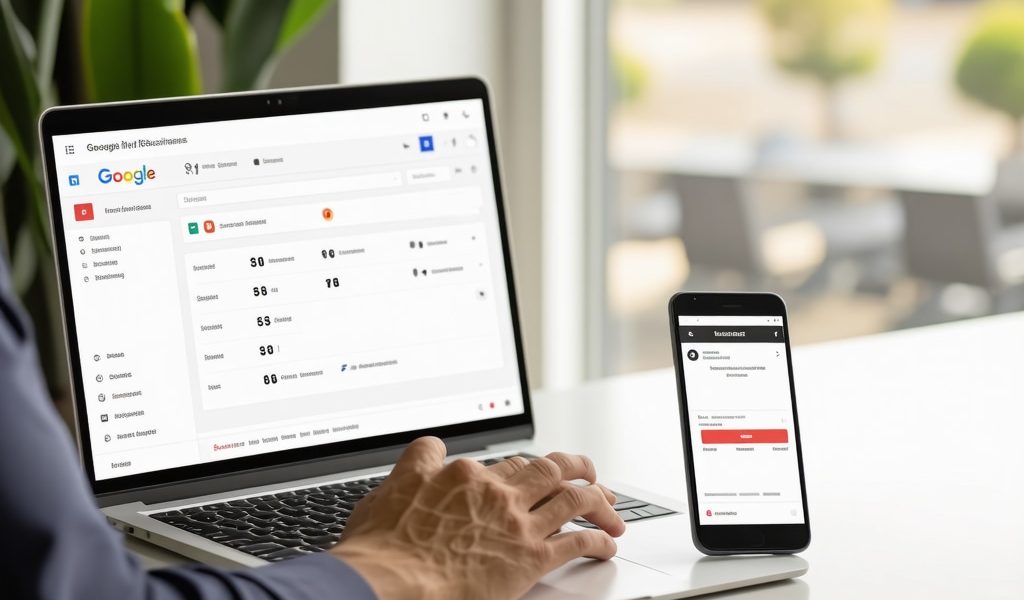Unlocking the Power of Google My Business Verification
In the competitive landscape of local search, verifying your Google My Business (GMB) listing swiftly is a game-changer. Verification not only confirms your business’s legitimacy but also unlocks critical features that enhance visibility and customer trust. This guide dives into expert-backed quick steps to verify your GMB listing fast, empowering you to dominate local search results and drive meaningful traffic.
Streamlining Verification: The Essential Quick Steps
Pinpoint Your Business Information with Precision
Accurate and consistent business information is foundational to fast GMB verification. Ensure your business name, address, and phone number (NAP) match exactly what appears across your website and other local citations. Discrepancies can delay verification or harm your local SEO rankings. Use tools like Moz Local or BrightLocal to audit your NAP consistency efficiently.
Choose the Most Efficient Verification Method Available
Google offers several verification options: postcard by mail, phone, email, instant verification, and bulk verification for eligible businesses. While postcard verification remains common, phone or email verification can be faster if your business qualifies. Instant verification is available if you’ve already verified your website with Google Search Console. Selecting the right method can drastically reduce waiting times.
Prepare for Postcard Verification: Optimize Your Reception
If postcard verification is your only option, prepare proactively. Confirm your mailing address is correct and accessible. Inform your staff or reception to expect the postcard, which typically arrives within 5–14 days. Promptly entering the verification code upon receipt ensures no unnecessary delays.
How Can You Expedite Verification While Avoiding Common Pitfalls?
Expediting GMB verification demands vigilance against typical obstacles. Duplicate listings or conflicting information can stall the process. Before applying for verification, perform a thorough search to identify and remove any duplicate profiles—this step is crucial to prevent rejection or extended waiting periods. Additionally, maintaining compliance with Google’s guidelines, such as avoiding keyword stuffing in your business name, preserves your credibility with Google and speeds approval.
Leveraging Expert Insights for Seamless GMB Verification
Drawing from real-world experience, businesses that meticulously audit their information and select the optimal verification method often succeed in verifying within days rather than weeks. For example, a local bakery optimized its listing by matching NAP data across platforms and utilized phone verification, cutting down the process from two weeks to under 48 hours. Such strategic approaches highlight the practical benefits of understanding Google’s verification nuances.
Boost Your Local SEO Beyond Verification
Verification is just the first step. To maximize your Google Business profile’s impact, consider advanced optimization techniques that boost rankings and customer engagement. Explore comprehensive strategies in how to optimize your Google Business listing effectively and accelerate your local search performance.
For further authoritative guidance on Google My Business verification and its SEO implications, consult Google’s official resource on Verify your business on Google. This direct link provides the most current and detailed instructions straight from the source.
Have you experienced challenges with GMB verification or discovered unique tactics to speed up the process? Share your insights and questions in the comments below to help fellow local business owners thrive!
Understanding Google’s Verification Algorithm: What Moves the Needle?
Google’s verification process is not just a formality; it integrates complex algorithms that assess your business’s authenticity and relevance to local search queries. Beyond accurate NAP consistency, factors such as user engagement signals, citation authority, and historical business data influence how quickly your listing gets verified and ranked. Aligning your strategy with these algorithmic nuances can dramatically reduce verification delays and enhance your local SEO performance.
What Are the Hidden Factors Affecting GMB Verification Speed?
Experts often overlook subtle yet impactful elements that can affect verification speed. For instance, businesses operating in highly competitive niches or densely populated areas may experience longer verification times due to stricter scrutiny by Google’s automated systems. Moreover, the presence of conflicting data across third-party directories or inconsistencies in business categories can trigger manual reviews, prolonging the process. Ensuring your business category aligns precisely with your services and auditing all online mentions for coherence is crucial.
Additionally, Google’s spam detection mechanisms increasingly rely on machine learning models that flag suspicious patterns such as frequent changes to business information or use of generic phone numbers. Consistency and transparency in your GMB profile updates foster trust with Google’s systems and facilitate smoother verification.
Integrating Citation Management for a Stronger Local Footprint
Citations—mentions of your business name, address, and phone number on other websites—play a pivotal role in local search credibility and verification ease. Managing these citations strategically can amplify your business’s trustworthiness in the eyes of Google.
Begin by identifying your existing citations using tools like expert GMB citation services. Prioritize cleaning up duplicates, correcting inconsistent data, and enriching your citations with relevant categories and attributes. This task not only supports faster verification but also bolsters your overall local SEO, enhancing visibility in the Google 3-Pack and Maps.
For ongoing citation health, automate monitoring to catch and rectify discrepancies quickly. This proactive approach ensures that your Google Business profile remains authoritative and aligned with Google’s quality standards.
Leveraging Bulk Verification for Multi-Location Enterprises
For businesses managing multiple locations, bulk verification offers a streamlined path to verify numerous listings simultaneously. However, this capability requires meeting Google’s eligibility criteria, including having 10 or more physical store locations under the same business entity.
Preparing for bulk verification involves consolidating consistent data across all listings and ensuring each location complies with Google’s guidelines. Employing bulk upload tools and maintaining a robust citation network for each site expedites both verification and ranking.
Utilizing bulk verification not only saves time but also centralizes management, enabling scalable local SEO strategies tailored to each location’s market dynamics. This method is indispensable for franchises or regional chains aiming to dominate local search landscapes efficiently.
Expert Source Highlight: Insights from Moz on Citation and Verification Best Practices
According to Moz, a leader in SEO expertise, “accurate citations and consistent NAP data across platforms are fundamental to Google My Business verification and local search visibility.” Their comprehensive analysis underscores the importance of combining citation management with precise GMB optimization to achieve superior local rankings and faster verification.[Moz Local SEO Guide]
Engage with the Community: Share Your Verification Success Stories or Challenges
Have you discovered unique tactics to accelerate your Google My Business verification or faced unexpected hurdles? Your experiences provide valuable insights for fellow local business owners navigating this critical step. Comment below to contribute to a growing knowledge base of practical verification strategies and optimization tips.
For further expert guidance, explore our detailed resources on GMB SEO audits and fastest ways to rank your Google Business profile to complement your verification efforts with effective ranking tactics.
Harnessing Machine Learning Insights to Navigate Google’s Verification Process
Google’s shift toward machine learning (ML) in evaluating business listings has added layers of complexity to the verification process, but understanding these nuances can provide a strategic advantage. Google’s ML algorithms analyze patterns such as update frequency, user interactions, and historical edits to flag suspicious listings or prioritize trustworthy ones. To leverage this, businesses should maintain a steady and transparent update cadence on their GMB profiles, avoiding erratic changes that might trigger algorithmic skepticism.
Moreover, engagement metrics like reviews, Q&A activity, and post interactions signal to Google’s systems that a business is active and legitimate, which can indirectly expedite verification. Thus, cultivating a proactive approach to customer engagement is not just beneficial for reputation but also for accelerating verification and ranking.
How Does User Engagement Influence the Speed and Success of GMB Verification?
User engagement acts as a credibility signal in Google’s algorithmic assessment during verification. Listings that actively respond to reviews, answer questions, and post timely updates demonstrate authenticity and operational presence. Google’s algorithms interpret this activity as a lower risk for fraudulent listings, potentially prioritizing such profiles for faster verification. Conversely, dormant profiles with minimal interaction may face extended verification scrutiny.
Therefore, integrating a robust engagement strategy alongside data accuracy can create a synergistic effect, smoothing the path to verification and enhancing local search prominence simultaneously.
Advanced Citation Network Optimization: Beyond Basic Consistency
While ensuring NAP consistency is foundational, advanced citation management delves into the quality, authority, and contextual relevance of referring domains. High-authority local directories, industry-specific platforms, and relevant niche sites contribute disproportionately to Google’s trust signals.
Implement a citation audit framework that not only identifies inconsistencies but also evaluates the trustworthiness of citation sources. Prioritize building citations on platforms with stringent editorial standards and active moderation, as these are weighted more heavily in Google’s local search algorithm.[Moz Local Citation Strategy]
Furthermore, enriching citations with structured data markup (Schema.org) across your website and key external listings enhances semantic clarity, aiding Google’s understanding and potentially accelerating verification and ranking processes.
Leveraging Bulk Verification: Tactical Considerations for Large Enterprises
Bulk verification, while a powerful tool for multi-location businesses, requires meticulous preparation to avoid common pitfalls that can delay or jeopardize approval. Each location’s listing must reflect precise, unique attributes, such as store hours or service offerings, tailored to local demographics or regulations.
Additionally, centralizing GMB management through the Google Business Profile Manager streamlines ongoing optimization and compliance monitoring. Employing automation tools to synchronize data changes across all locations reduces human error and maintains consistency—a critical factor for sustaining trust with Google’s verification systems.
For enterprises, integrating bulk verification with a custom-built analytics dashboard enables real-time tracking of verification statuses, engagement metrics, and ranking fluctuations, facilitating agile adjustments to local SEO strategies.
Integrating Structured Data and Local SEO Schema to Enhance Verification and Ranking
Structured data markup is a sophisticated yet underutilized tactic that can reinforce your GMB listing’s legitimacy and augment local SEO signals. Implementing LocalBusiness schema on your website helps Google better interpret your business details, such as address, phone number, service area, and operating hours, creating a cohesive data ecosystem that supports faster verification.
Advanced schema techniques include embedding review snippets, event information, and product details where applicable, enriching your profile’s contextual relevance. This semantic reinforcement aligns with Google’s Knowledge Graph, improving the listing’s prominence in local search results.
Regular audits to ensure schema markup accuracy and compliance with Google’s guidelines are essential to prevent penalties or misinterpretations that could hinder verification.
Empowering Your Verification Journey with Expert Tools and Resources
Utilize specialized platforms such as BrightLocal, Whitespark, and SEMrush’s local SEO toolkit to gain granular insights into your citation landscape, competitor benchmarks, and review analytics. These tools facilitate proactive identification of discrepancies, monitor GMB health, and automate reporting, significantly reducing manual overhead.
Additionally, subscribing to authoritative SEO newsletters and forums keeps you abreast of Google’s evolving verification algorithms and best practices, enabling you to adapt swiftly.
For an in-depth exploration of advanced local SEO techniques complementing GMB verification, visit our comprehensive guide on Advanced Local SEO Strategies for Business Growth.
Engage with our community or consult our experts to tailor verification and optimization plans specific to your industry and market dynamics—unlocking the full potential of your Google Business profile.
Decoding Google’s Verification Algorithms: A Deep Dive into AI-Powered Evaluations
As Google progressively integrates sophisticated artificial intelligence and machine learning into its verification algorithms, understanding these mechanisms becomes indispensable for businesses aiming to expedite their Google My Business (GMB) verification. The AI models assess multifaceted signals, including temporal update patterns, data provenance, and user-generated content activity, to gauge the authenticity and vitality of a business profile. Businesses that strategically synchronize their profile updates and foster genuine customer interactions stand to benefit from accelerated verification timelines and enhanced local search rankings.
How Can Enterprises Leverage AI Trends to Optimize Verification Outcomes?
Enterprises should prioritize maintaining a consistent and transparent update cadence across their GMB profiles. This entails systematically updating business hours, posts, and service offerings while actively engaging with reviews and Q&A sections. Such behavioral patterns align with Google’s AI-driven trust models, reducing the likelihood of manual review flags and verification delays. Furthermore, integrating AI-powered tools like BrightLocal’s citation monitoring and SEMrush’s local SEO audits can preemptively identify discrepancies that might hinder verification.
Advanced Linkage of Structured Data and Semantic SEO: Elevating Your GMB Profile’s Contextual Authority
Beyond basic schema markup implementation, deploying advanced semantic SEO strategies can significantly enhance your GMB profile’s contextual relevance. Utilizing nested LocalBusiness schema with precise property associations—such as hasOfferCatalog for service listings and areaServed for localized targeting—enables Google’s Knowledge Graph to construct a richer, more authoritative understanding of your business. This semantic precision not only bolsters verification credibility but also amplifies visibility in hyperlocal search results.
Strategic Integration of Citation Networks with Industry-Specific Authority Domains
Augmenting your citation network by securing listings on high-authority, industry-specific directories can exponentially increase your business’s trustworthiness signals. Prioritize platforms with rigorous editorial standards and active user engagement, such as niche trade association directories or professional review sites relevant to your sector. This selective citation approach complements Google’s emphasis on quality over quantity in local SEO signals, thereby expediting verification and enhancing post-verification ranking potential.
Harnessing Bulk Verification with Scalable Data Governance Frameworks
For multi-location enterprises, implementing scalable data governance frameworks is pivotal to harnessing the full benefits of bulk verification. Centralized control systems should enforce uniformity in critical data points while allowing location-specific customizations to reflect local market nuances. Coupling these frameworks with automated validation tools mitigates risks of data drift and ensures continual compliance with Google’s evolving standards, guaranteeing sustained verification status and optimal local search performance.
Authoritative Source Spotlight: Moz’s Latest Research on Local SEO Verification Dynamics
In their recent comprehensive study, Moz emphasizes that “the interplay between citation quality, structured data fidelity, and user engagement metrics forms the cornerstone of efficient GMB verification and superior local search rankings.” Their findings advocate for an integrated approach combining meticulous data management with proactive customer interaction strategies.[Moz Local SEO Verification Research]
Engage with Our Expert Community: Share Your Advanced Verification Tactics and Insights
We invite you to contribute your experiences and sophisticated strategies for accelerating Google My Business verification. Whether you have implemented AI-driven monitoring tools, optimized semantic schema, or navigated bulk verification complexities, your insights are invaluable to our expert community. Join the conversation below and empower your peers with cutting-edge approaches to mastering local SEO verification.
Frequently Asked Questions (FAQ)
What is Google My Business verification and why is it essential?
Google My Business (GMB) verification is the process by which Google confirms the legitimacy and ownership of a business listing. Verification unlocks full control over your profile, enabling you to manage information, respond to reviews, and appear prominently in local search and Google Maps results. Without verification, your business may not be visible or trusted by potential customers.
Which verification method should I choose for the fastest approval?
The fastest method depends on your business eligibility. Instant verification is quickest if you already have verified your website with Google Search Console. Phone or email verification can be immediate but are limited to certain business types and locations. Postcard verification is the most common but takes 5–14 days. Bulk verification is ideal for multi-location businesses meeting Google’s criteria.
How do duplicate listings affect GMB verification speed?
Duplicate listings create confusion and conflict in Google’s system, often triggering manual reviews or outright rejection of verification requests. Identifying and removing duplicates beforehand is critical to avoid delays and ensure Google trusts your business data.
Can user engagement influence the verification process?
Yes. Active engagement signals such as responding to reviews, posting updates, and answering Q&A demonstrate to Google’s algorithms that your business is legitimate and operational. This can reduce verification scrutiny and potentially speed the process.
Why is citation consistency important beyond just basic NAP accuracy?
While consistent Name, Address, and Phone (NAP) data is foundational, the authority and relevance of citation sources also impact Google’s trust. High-quality, industry-specific, and locally authoritative citations amplify credibility, improving verification speed and local search rankings.
How can structured data markup improve my GMB profile verification and ranking?
Structured data (Schema.org) on your website helps Google semantically understand your business details, creating alignment with your GMB profile. This cohesive data ecosystem supports faster verification and enhances local SEO performance by feeding Google’s Knowledge Graph with precise and rich information.
What are common pitfalls to avoid during bulk verification of multiple locations?
Common pitfalls include inconsistent data across locations, inaccurate or duplicate listings, and failure to customize local attributes like store hours or services. Centralized data governance and automation tools can mitigate these risks, ensuring smooth bulk verification and sustained local SEO success.
How do Google’s AI and machine learning technologies impact GMB verification?
Google employs AI and ML models to analyze patterns, detect fraudulent activity, and evaluate business authenticity. Maintaining consistent updates, engaging with customers, and avoiding suspicious behaviors align your profile with these AI models, facilitating faster verification and improved rankings.
Are there specialized tools recommended for managing GMB verification and citation health?
Yes. Tools like BrightLocal, Whitespark, and SEMrush offer comprehensive citation audits, competitor benchmarks, and review analytics. These platforms automate discrepancy detection, monitor profile health, and provide actionable insights, empowering businesses to maintain verification standards efficiently.
How can businesses prepare for postcard verification to minimize delays?
Ensure your mailing address is accurate and accessible, inform reception or staff to watch for the postcard, and promptly enter the verification code upon receipt. Proactive preparation reduces the risk of lost mail and unnecessary waiting periods.
Trusted External Sources
- Google Business Profile Help Center – The official Google resource providing up-to-date, authoritative guidelines on verification procedures, eligibility, and troubleshooting, essential for accurate compliance.
https://support.google.com/business/answer/7107242 - Moz Local SEO Guide – Moz is a leading SEO authority offering in-depth research and best practices on citation management, verification dynamics, and local search optimization, invaluable for strategic planning.
https://moz.com/learn/seo/local-seo - BrightLocal Blog and Tools – Specialized in local SEO analytics and citation tracking, BrightLocal provides practical tools and expert insights to manage GMB profiles and enhance verification success.
https://www.brightlocal.com/resources/ - SEMrush Local SEO Toolkit – Offers comprehensive local SEO audits, citation monitoring, and competitor analysis, helping businesses maintain consistent data and optimize verification.
https://www.semrush.com/local-seo/ - Google Search Central Blog – Provides updates on Google’s algorithm changes, structured data guidance, and machine learning integrations relevant to GMB verification and ranking.
https://developers.google.com/search/blog
Conclusion
Mastering Google My Business verification is a critical gateway to unlocking enhanced local visibility, customer trust, and competitive advantage. By meticulously maintaining accurate and consistent business information, strategically selecting the optimal verification method, and leveraging advanced tactics such as citation authority, structured data markup, and user engagement, businesses can accelerate verification timelines and amplify local SEO impact. Understanding Google’s evolving AI-driven algorithms empowers businesses to align their profiles with trust factors that expedite approval and improve rankings. Multi-location enterprises benefit from scalable bulk verification frameworks coupled with centralized data governance to efficiently manage complex portfolios.
With the right tools, knowledge, and community engagement, your Google Business profile can become a powerful asset driving sustained growth in local markets. We encourage you to apply these expert insights, share your own experiences, and explore our related expert content to continue refining your local SEO mastery and verification success.




I recently worked on verifying a multi-location retail chain’s Google My Business listings, and the key was definitely maintaining consistent NAP data across all platforms and alerts for duplicate profiles. We also used the bulk verification option effectively, which saved us a lot of time. One challenge we faced was ensuring that each location’s specific attributes, like store hours and services, were correctly customized, preventing any manual review delays. Engaging with reviews and regularly updating posts seemed to build trust with Google’s algorithms, too, which may have sped up the process.
I’m curious—has anyone found certain industry-specific citation sites to be particularly effective for speeding up verification or boosting local rankings? It would be great to hear about successful strategies or tools that others have used to streamline citation and profile optimization beyond basic NAP consistency.